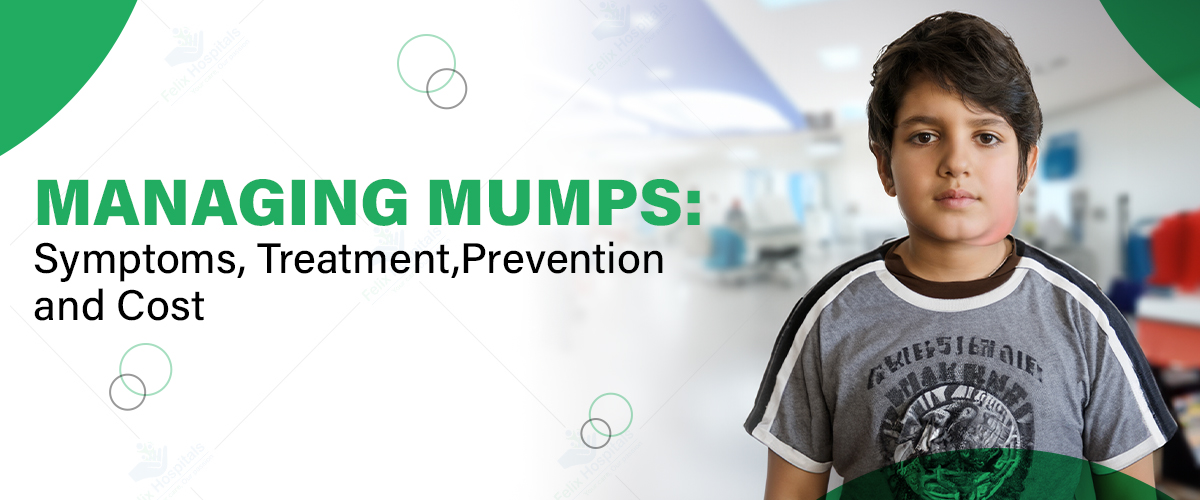
Subscribe to our

Mumps is a contagious viral infection that primarily affects the salivary glands, causing swelling in the face and neck area. While vaccines have made mumps less common in many parts of the world, outbreaks can still occur, particularly in areas with low vaccination rates. Managing mumps effectively requires understanding the symptoms, treatment options, prevention methods, and the potential cost of care. This guide aims to provide the best information on mumps to help you identify and manage the condition better.
If you have mumps, it's important to seek timely medical care. Knowing how to manage mumps is crucial, but having access to the Best mumps treatment hospital for children can make all the difference in ensuring a swift and smooth recovery.
If you or a loved one is experiencing symptoms of mumps, don’t hesitate to contact us today at +91 9667064100 for professional care and advice at Felix Hospital.
Mumps is an infectious viral disease caused by the mumps virus. It typically affects the parotid glands, which are one of three sets of salivary glands located near your ears. The virus can cause painful swelling in these glands, leading to noticeable puffiness in the face. Mumps can also affect other parts of the body, including the brain, pancreas, and reproductive organs, though these complications are less common.
Mumps primarily spreads through respiratory droplets from coughing or sneezing, and it can also be transmitted by sharing utensils or touching surfaces contaminated with the virus. Once a person is infected, the virus has an incubation period of about two weeks before symptoms start to appear.
Symptoms of mumps can vary from person to person, but the most common and recognizable symptom is swelling in the parotid glands. Some people may have very mild symptoms or none at all, especially if they’ve been vaccinated. However, for those who do experience symptoms, they typically appear around 16-18 days after exposure to the virus.
Mumps is caused by the mumps virus, a member of the paramyxovirus family. It spreads from person to person through infected saliva, nasal secretions, and close contact with an infected individual. You can contract the virus by:
The risk of contracting mumps increases if you are not vaccinated, travel to areas where mumps is prevalent, or spend time in close-contact settings, such as schools, colleges, or dormitories.
Diagnosing mumps usually begins with a physical examination, where the doctor will look for the characteristic swollen parotid glands. The doctor may also ask about your symptoms and recent exposure to anyone with mumps. In addition to the physical exam, several diagnostic tests may be used to confirm the infection:
There is no specific antiviral treatment for mumps. The infection is typically self-limiting, meaning it resolves on its own within a few weeks. However, treatment focuses on relieving symptoms and preventing complications. Common treatments include:
For more severe cases, especially those involving complications like meningitis or orchitis, hospitalization and more intensive care may be required. In such situations, antiviral or anti-inflammatory medications may be administered to manage symptoms.
Prevention is primarily achieved through vaccination. The mumps vaccine is part of the MMR (measles, mumps, and rubella) vaccine, which is typically given in two doses during childhood. The vaccine is highly effective, significantly reducing the risk of mumps infection.
The Cost of mumps treatment in Noida depends on several factors, including the severity of the infection, the treatment required, and the healthcare facility chosen for care. Consultation with a pediatrician can help you understand the costs involved based on your specific needs.
At Felix Hospital in Noida, we take pride in our team of highly skilled pediatricians who specialize in treating a wide range of childhood infections, including mumps. Dr. Vishrut Singh, Dr. Prabhat Kumar, and Dr. Niraj Kumar are dedicated to providing compassionate, personalized care for every young patient, ensuring their health and well-being are prioritized.
With state-of-the-art medical facilities, our team is committed to delivering prompt and effective treatment for all pediatric conditions. If you're seeking the best pediatric care in Noida for mumps or any other health concern, contact us today for expert guidance and treatment.
For expert medical care, contact Felix Hospital at +91 9667064100 or visit our website for more information. We are here to support your health and well-being.
Mumps is a viral infection that can lead to significant discomfort and potential complications, but with the right care and preventive measures, it is manageable. Understanding the symptoms, causes, and treatment options can help you take the necessary steps to protect yourself and others from the infection. If you experience any signs of mumps, it’s essential to consult a healthcare professional for diagnosis and treatment.
1. What are the first signs of mumps?
Ans: The first signs usually include swelling of the salivary glands, fever, headache, and fatigue.
2. How long do mumps last?
Ans: Mumps typically lasts for about 7 to 10 days, though full recovery can take up to two weeks.
3. Can mumps be prevented?
Ans: Yes, mumps can be effectively prevented through vaccination (MMR vaccine) and practicing good hygiene.
4. Is mumps contagious?
Ans: Yes, mumps is highly contagious and can spread through coughing, sneezing, or sharing utensils.
5. Can adults get mumps?
Ans: Yes, adults can get mumps, especially if they haven’t been vaccinated or were only partially vaccinated.
6. Is there a cure for mumps?
Ans: There is no specific cure for mumps; treatment focuses on relieving symptoms and preventing complications.
7. What complications can arise from mumps?
Ans: Complications include meningitis, orchitis, oophoritis, pancreatitis, and, in rare cases, hearing loss.
8. When should I see a doctor for mumps?
Ans: You should see a doctor if you experience swollen glands, fever, and pain while chewing or swallowing.
9. Is the MMR vaccine safe?
Ans: Yes, the MMR vaccine is safe and effective in preventing mumps, measles, and rubella.